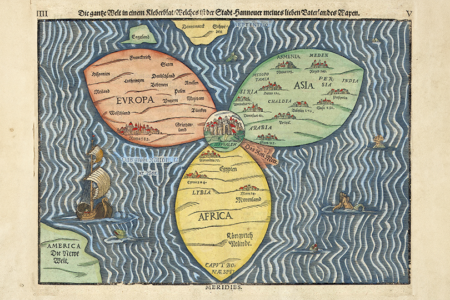What Is a Christian?
“If what we have seen of Christianity over the past two thousand years is the best it has to offer, I don’t need to hear anything you have to say; I am not interested in your Christ.”
The speaker was quivering with rage. “Wasn’t Germany a great center for Christianity? And yet millions of defenseless Jews died in that Christian country. Christian crusaders, Christian inquisitors, Christian popes, they are all alike. They have given us pogroms, expulsions, ghettos, badges and graves. No, No! I don’t need to hear any more of what you have to say. Don’t waste more of my time.”
With that he turned and hurried on his way up the street, while a bewildered believer in Jesus as the Messiah of Israel stood in his wake wondering what had hit him.
What about it? Was the irate son of Jacob correct in his evaluation of Christianity? Is all Christianity has to offer Jewish people scorn, swords and stones? How can one reconcile what church councils and Christian zealots have done in Christ’s name to Jews across the centuries? And, after all, is the church only for Gentiles?
The best place to begin to approach these questions, of course, is with a forthright admission of the truth. History is replete with glaring examples of the persecutions that have been heaped upon the heads of successive generations of Jewish people by “Christians”. Yes, many times these atrocities were official policy of the church and reigning Christian monarchs or officials. In view of this, Jewish people have every justification to recoil at the thought of what they or members of their families have suffered at the hands of some who have professed to follow Jesus. But while we readily admit the factuality of these accusations, we quickly propose that the case is not closed with this admission. As a matter of fact, to turn one’s back at this point is a gross injustice to Jesus Christ, who was Himself a Jew, and to millions of His followers who, across the centuries, have found these acts to be as abhorrent as did their Jewish counterparts.
One can begin to identify the line of demarcation between true and spurious Christianity as he comes to understand what a Christian actually is. Allow me to offer a clarifying statement: There is a vast difference between Christianity as a living reality and Christianity as a religious prejudice. Jewish people can quickly draw a dear analogy to this statement from the history of their own nation. Israel’s greatest prophets often suffered ridicule and violence at the hands of their countrymen who made loud professions of religious faith, but manifested none of the qualities of a true walk with Jehovah. False prophets came repeatedly onto the scene to delude the Chosen People, all the while claiming to receive their authority from above. While this was unquestionably true, it is also a fact that in every period of Israel’s history there was a faithful remnant of genuine believers who gave evidence of the living reality of biblical Judaism through lives of consistent obedience to their God.
Christianity, A Living Reality
In order to demonstrate the properties of Christianity as a living reality, we will return to the original source of revelation – that is, where the term “Christian” first surfaces in the biblical Chronicle. The word first appears in Acts 11:26. It means simply, “Christ’s men” or partisans of Jesus Christ. Particularly illuminating is the context in which this passage is set, and from which the term was coined.
The infant church, which was at this time almost exclusively Jewish in its constituency, was laboring under severe persecution. In the aftermath of the stoning of Stephen in Jerusalem, these Jewish believers in Christ were driven from their homes in Jerusalem and forced to flee to other localities in search of a safe haven. Those under discussion found their way to Antioch in Syria, a bustling center of activity which served as a hub of the Eastern Roman Empire. These were common men and women of faith, who held an intense love for the Messiah. Some in their midst had personally seen Him after His resurrection from the dead. Their faith was a simple one: He was the sole object of their love and loyalty. Christ, to them, was a living, personal reality in whom all of life for time and eternity was centered. Church politics, hatred and persecuting militancy were unknown to them. They loved a risen Christ, and were obsessed with a desire to worship and serve Him. They reflected, under the stress of their suffering, the same spirit of gentleness which had been evidenced in their Lord’s suffering at the hands of His tormentors.
The fact that these people who were so out of step with paganism survived at all is viewed as one of the great miracles of history. A secular historian set about the task of analyzing the reasons for the survival of the early church. His observations are illuminating.
There were many factors in the situation which hampered the growth of the new religion. Indeed, that it spread as rapidly as it did, and that it rose to final triumph over all other religions, is the most remarkable fact of its history, the greatest of Christian miracles . . . Christianity had begun under what might seem to be the most unfortunate circumstances, in a rebellious province among men of a stubborn and seditious race, which could not be assimilated and which was hated and despised by the other peoples of the empire. The first apostles were not only Jews, but Jews who were disowned by their own people . . . Yet, despite all the disadvantages under which it labored, there were elements in Christianity which made it irresistible. The figure of Christ loomed large in the thought of the early church . . . Christianity of this period was the religion of Christ. His followers had as a central fact of their religion a definite personal Saviour, who supplied in the only satisfactory way that connecting link between man and God, for which the philosophers and the devotees of pagan cults were blindly groping. This faith in an historical Saviour carried with it a definiteness of conviction in the reality of salvation, of the expiation of sin, and the immortality of the soul . . . At the same time, Christianity gave men hope for the future, not only for themselves as individuals, but for the world . . . they looked forward with confident expectation to the dawn of a golden age in the future, when the second coming of Christ Jesus would herald the establishment of the Kingdom of God on earth . . . They had peace of mind, hope and certainty, strong enough to carry them through the fires of persecution.1
These early believers were at one with the apostles and Stephen, the first Christian martyr, in this matter. When the apostles were taken into custody by the authorities in Jerusalem for preaching Christ, they were flogged before their release. Their reaction was: “And they departed from the presence of the council, rejoicing that they were counted worthy to suffer shame for his name” (Acts 5:41). As Stephen bowed beneath a hail of stones cast by his executioners, he exclaimed, “. . . Lord, lay not this sin to their charge . . .” (Acts 7:60).
Such was the soil of faith out of which the Christians at Antioch had sprung, and the quality of character the Christian Gospel produced. It is a matter of record that, in spite of their tormentors, these Hebrew Christians manifested such an infectiousness of spirit that their Gentile neighbors soon began to take note of their lives. Later, they would listen to the message regarding the source of their peace and joy. Soon a great host of Gentiles had responded to the preaching of these displaced Jews and accepted the Jewish Messiah as their own Saviour. Word of this great phenomenon quickly permeated the surrounding area. The transformation was so complete and so much in evidence that these at-one Jews and Gentiles became known collectively as “Christ’s men”, or Christians. The mark of Jesus Christ was clearly upon them.
It was in this spirit that the Christian Church moved across the first centuries of its existence. Believers, Jew and Gentile, would bear the brunt of persecution by pagan tormentors. There would scarcely be a time, until after 300 A.D., when the followers of Jesus would not be in danger of martyrdom for their faith. With the ascendancy of Constantine in the Roman Empire, a dramatic change began to take shape, one which, in many respects, bode ill for Jews and true believers in Christ alike.
Christianity, as a Religious Prejudice
For reasons we shall not detail here, Constantine saw personal advantage in an alliance with Christianity. Consequently, he concocted the account of his famous vision of a shining cross and the phrase, Hoc Signo Vinces – “By this sign thou shalt conquer.” Thus the most incongruous of unions was consummated: The cross of Christ became the official standard of the imperial Roman legions.
The important consideration resulting from Constantine’s act is the fact that for the first time Christianity was transformed into an instrument – an instrument of power and intimidation to be wielded by secular hands for material and prejudicial purposes. Now there would be two identifiable segments in the ranks of professed Christianity: those who held the faith as an intense personal reality, and those who used the Christian religion to their own ends. And so the die was cast and history began to record what transpired as the conquering “Christian” sword was employed against “the enemies of God”. A crucial point needs to be made: When the sword of oppression was unsheathed by politicized Christianity, it fell with equal severity upon the heads of Christian minorities and the adherents of Judaism.
With the demise of political Rome, the instrument was passed to the hands of an imperial clergy whose motives were no less regrettable than their predecessors. The church and petty sovereigns would conspire to harass, exploit and afflict the most consistently conspicuous scapegoat available, the Jewish people. Even though the Reformation served to turn men toward a more biblical view of Christianity, the residual effect of branding Jews as “Christ killers” stubbornly lingered in some quarters. Martin Luther is a notable example, with his documented anti-Semitic tendencies.
To label this historical period, regardless of how deeply robed in clerical garb it may have been, as the logical consequence of the message of Christ and the New Testament writers is as unfair as it would be to accuse Moses of responsibility for the attacks by the Amalekites on ancient Israel as they passed through the wilderness.
There are numerous sources of information which will put to rest the notion that persecutions undertaken by “Christians” reflect in any way the spirit of Christ or the commission of the New Testament to the Church. I will mention only three.
First, there is the biblical record itself. Jews who take the time to read the New Testament are almost universally startled to find that, contrary to what they have been told, they are reading a Jewish book. A Jewish friend emphasized this fact in a conversation a short time ago. She said of her first encounter with the New Testament: “I had been both ashamed and afraid to read it because I felt it was traitorous to read a book which had brought so much suffering to my people. As I began to read, however, I could not help exclaiming aloud, ‘This is a Jewish book!’ I found none of the things which had been done to us endorsed in it, but rather an extension of what I had read previously in our Jewish Bible.” It can, indeed, be said that the New Testament is a Jewish book. All of the writers, with the possible exception of one, were Jewish. The heart thrust of the message of Christ and the penmen of Scripture can be summarized in the words of Paul, the Pharisee turned Christian apostle: “. . . Hath God cast away his people? God forbid. For I also am an Israelite, . . . God hath not cast away his people. . . ” (Rom. 11:1, 2).
Next, one must consider the history of the infant church, which embodied simple obedience to the commission of Christ to His people. As I indicated above, the early church was almost totally Jewish and intimately involved with the person of Christ, so much so that the telling point in the attractiveness of the “new religion” to Gentiles was the purity, peace and unbounded joy evidenced in the lives of these Hebrew Christians. They were a glorious contradiction to the jaded products of the pagan religions of the day. Thus, it is historically accurate to say that it was Jews who swept Gentile communities with the message of the Jewish Messiah-Saviour and initiated the process of conversion to Christ which has endured throughout the centuries. The universality of the appeal of their Gospel leaped geographical barriers, cultural chasms and color lines. The fact that it comes to us some twenty centuries later as fresh and vital to our needs as it did to ancient hearts and minds is evidence that it emanated from God. As a matter of fact, the abiding impact of that message can only be properly assessed in the light of what both covenants of our Bible had predicted.
Finally, we should view the individual adherents to the Christian faith. Undeniably, over all of the centuries, there have been those who have manifested the living reality of allegiance to Jesus Christ. This band has been made up of remnants from Jewry and Gentiles who have deplored and opposed the use of Christianity as an instrument of destruction and offered, instead, a message of love and peace. They were there, though often ignored or forgotten, throughout all of Israel’s periods of trauma. Recent examples show them laboring side by side with Jews to bring about the establishment of the modern State of Israel, coming to the aid of victims of the Holocaust and standing firmly with the Jewish people in their current struggle against fanatical Mid-Eastern and global anti-Semitism.
A few evenings ago, I sat in a circle of believers in the living room of Hebrew-Christian friends. I was immediately aware of the fact that, although the group was comprised of Jews and Gentiles, there was no division in our ranks. Jews were still Jews, and Gentiles were still Gentiles, of course; but there was a oneness that defies explanation apart from understanding the person and power of Christ – this was a totality of union in the Messiah which contradicted the entire flow of the Jew versus Gentile/Jew versus Christian mentality. We collectively thrilled as we pursued the prophetic destiny of the Jewish people. We parted as those who loved one another. But above all else, we were possessed by a deep love for Him. That, my friend, is what a Christian is, and what Christianity is all about!
ENDNOTE
- Carl L. Becker, (ed.), A Survey of European Civilization (Boston: Houghton Mifflin Co.), pp. 107, 110.







